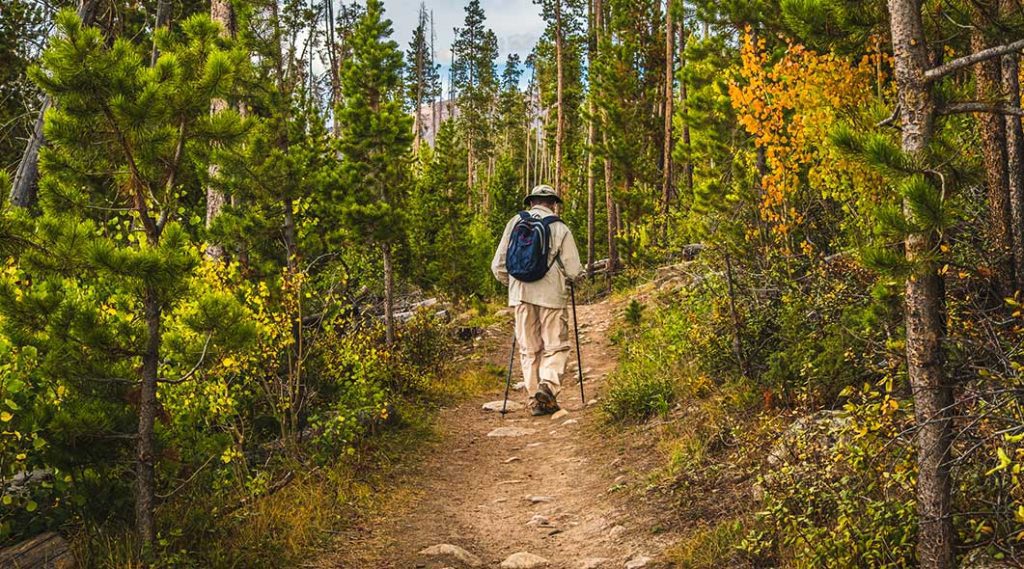The beautiful mountain communities and adventure-filled outdoors of our Great Smoky Mountains only stay beautiful, with the potential for fun and adventure, because of the care and respect locals and visitors show through their actions and choices while appreciating the area. There are 7 principles of Leave No Trace which help ensure the care and safety of the natural resources, the wildlife and our fellow visitors.
PLAN AHEAD, BE PREPARED
The first principle of planning ahead and being prepared may be best exemplified in a visit to Clingman’s Dome. It is the highest mountain in the Great Smoky Mountains National Park which means a couple things – it experiences high levels of traffic and visitors at times, and there can be extreme weather conditions that shift quickly. For both of these reasons, planning a visit around non-peak tourist time, and being prepared for potentially harsher temperatures is a must for an enjoyable excursion.
STAY ON THE TRAILS
The Great Smokies offers numerous opportunities for backcountry camping throughout the majority of the year. These trips can be wonderful times to actively participate in the wildness of spending quality time outdoors. They should also be times of awareness of where you’re hiking and setting up camp. Keeping foot traffic to established trails while hiking, and using existing campsites will aid in maintaining the undisturbed woodland areas, as well as protecting wildlife.
PACK IT IN, PACK IT OUT
Needing a bathroom break while on a hike is not ideal, but it is reality, especially on longer trails. And of course, out in the woods, there are no facilities – just more woods. There are many trails, Black Balsam Knob and Tennent Mountain Loop in the Shining Rock Wilderness, for example, where once you’re out there, well, there you are! So, when nature is calling you, make the choice to move at least 200 feet from any water source, campsite and trail and dig a 6-8 inch hole, make your deposit, then cover it back up. Toilet paper can be buried with, or carried out, with any other trash or litter.
LOOK WITH YOUR EYES
Remember being young and told to “look with your eyes, not your hands”? The same principle applies to the outdoors. Behold the natural beauty with your eyes and your camera only. Do not take rocks, plants or any other natural object found. This also means don’t alter what you see. Deep Creek Trail in Bryson City is celebrated for its streams and waterfalls which means rocks and lots of them. Stacking the rocks, moving the rocks and/or taking the rocks is a no-no, as tempting as it may feel.
MINIMIZE CAMPFIRE
There are many good reasons to avoid building unnecessary fires out in the woods, so unless it’s required for heat or for cooking, skip it. Lanterns can be used for light and camping stoves for cooking. If a fire is built, use only an established fire ring, pan or mound, and keep it small – no one wants to deal with a fire out of control. Make sure any fire is completely put out. Warm embers can still spread if a strong enough wind blows though, and at higher elevations this is not uncommon. Smokey Bear’s message still stands – only you can prevent forest fires.
RESPECT WILDLIFE
A visit to Cades Cove is a perfect example of where respecting wildlife is crucial for everyone – animals and humans alike. When we are intruding on land that is home to deer, elk, black bears, turkeys and so many others, we must be respectful. This means observing ONLY, and from a safe distance, never following or approaching and most definitely never feeding wild animals. Keeping pets leashed and under control (or if that isn’t possible, leaving them at home) is a given.
BE CONSIDERATE OF OTHERS
There is trail etiquette, even if it’s not printed on flyers or up on posters at the Ranger Station. Basic consideration for your fellow hiker means no excessive noise, no uncontrolled pets. It means sharing the trail with courtesy. Bikers yield to horses and hikers. Hikers yield to horses. Remember that every hiker, biker and horseback rider has the same goal – an enjoyable experience in the Great Smokies – and do your part to provide that outcome for all.
Learn more about how you can make it your nature to protect North Carolina’s outdoor spaces.

